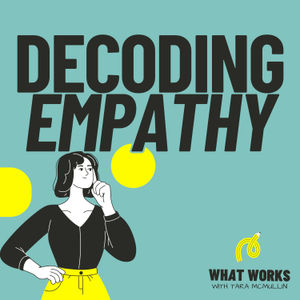
What Works
Tara McMullin
EP 464: Decoding Accessibility with Erin Perkins

EP 464: Decoding Accessibility with Erin Perkins
Description
Typically, the question of accessibility online is considered in technical terms: How does this website need to be designed? What ALT text is appropriate for this image? Are captions available for this video? And obviously, knowing the technical aspects of accessibility is important.
But if accessibility stops at the technical requirements, we forget that there are people on the other side of those checklists and manuals. We forget that even the most rigorous checklist can’t account for everyone and their experiences. We forget to ask critical questions that seem obvious when it comes to a backstage pass but are readily dismissed when it comes to most other social spaces.
In the 3rd episode of my 5-part series on Decoding Empathy, I talk with Erin Perkins, an accessibility educator and the founder of MabelyQ, and draw on the work of disability studies scholar Tanya Titchkosky to theorize the overlap between access and empathy—and what it means for you.
Footnotes:
- Learn more about Erin Perkins and MabelyQ
- The Question of Access by Tanya Titchkosky
- Impact of post-COVID symptoms on US adults via the CDC
- WC3's Web Accessibility Initiative tips for online content
- "Autism Spectrum Disorder diagnosis as biographical illumination" by Catherine Tan
- "Coming Out Disabled" by Tanya Titchkosky
Every episode of What Works is also available in essay form at whatworks.fyi
What Works is funded by readers and listeners. To help support this work, upgrade to a premium subscription for just $7 per month.